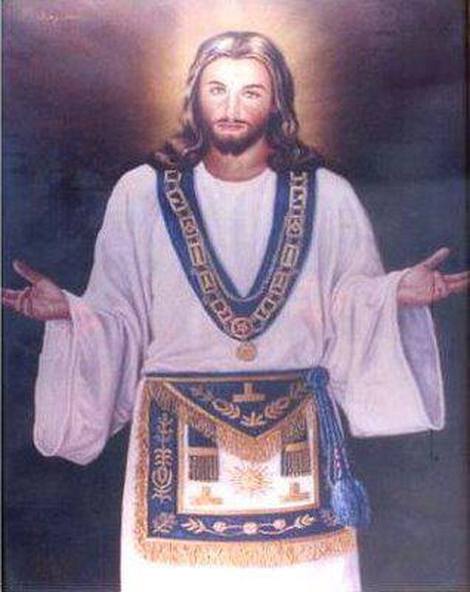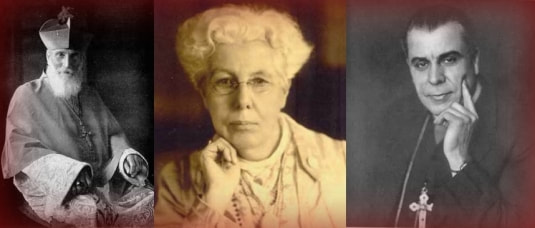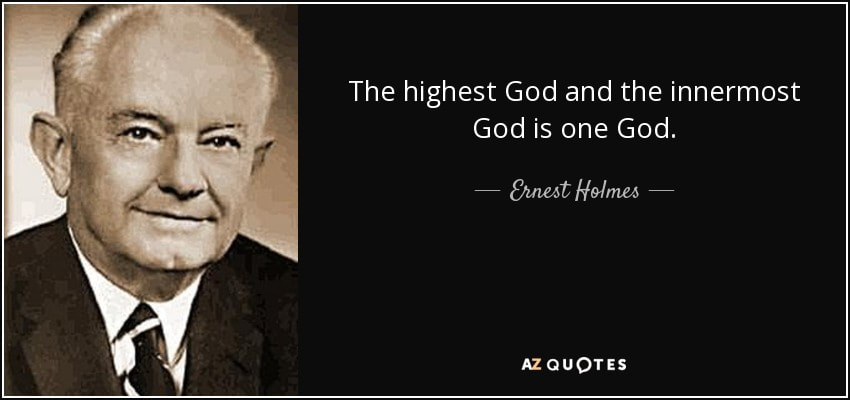Some Personal Reflections on the First Ray Benediction - by Tau Blaise
May the Holy Ones, whose pupils you aspire to become, show you the light you seek, give you the strong aid of their compassion and their wisdom. There is a peace that passeth understanding; it abides in the hearts of those who live in the eternal; there is a power that maketh all things new; it lives and moves in those who know the self as one. May that peace brood over you, that power uplift you, till you stand where the One Initiator is invoked, till you see his ✧ star shine forth. R/. Amen.
The above blessing was written by the Theosophical leader, Mrs Annie Besant, and is sometimes used at the end of the Liberal Catholic Eucharist, after the usual benediction ( Philippians 4:7):
"The peace of God, which passeth all understanding, keep your hearts and minds in the knowledge and love of God, and of his Son Jesus Christ our Lord; and the blessing of God Almighty, the Father, the Son, and the Holy Ghost, be amongst you, and remain with you always. Amen."
The meaning of Mrs Besant’s blessing may not be immediately apparent to a wide audience, hence my offering of these personal reflections.
“May the Holy Ones, whose pupils you aspire to become, show you the light you seek, give you the strong aid of their compassion and their wisdom."
Who, we may ask, are the “Holy Ones” to whom she refers? It appears that Mrs Besant was in fact referring to the highly dubious “Masters”, who were for the most part figments of the imagination of Helena Petrovna Blavatsky. However, the important point is that these “Holy Ones” were believed to be both compassionate and wise, and so are worthy of emulation. We may substitute our own saints and heroes. Personally, I am thankful for the spiritual companionship of the Holy Saints John, St Francis and St Clare, St Benedict and St Therèse, as well as our own dear saints; St Gregory of Parumala, St Tugdual II, Blessed James Ingall Wedgwood, Blessed Guilhem Bèlibasta and several others. Whether as near perfect on this side of life, or not, as the case may be, they soon achieved a greater degree of compassion and wisdom on the other side of life, unhindered by the weight of the flesh and human limitations. They are only too glad to assist us here, helping us along the road to enlightenment.
"The peace of God, which passeth all understanding, keep your hearts and minds in the knowledge and love of God, and of his Son Jesus Christ our Lord; and the blessing of God Almighty, the Father, the Son, and the Holy Ghost, be amongst you, and remain with you always. Amen."
The meaning of Mrs Besant’s blessing may not be immediately apparent to a wide audience, hence my offering of these personal reflections.
“May the Holy Ones, whose pupils you aspire to become, show you the light you seek, give you the strong aid of their compassion and their wisdom."
Who, we may ask, are the “Holy Ones” to whom she refers? It appears that Mrs Besant was in fact referring to the highly dubious “Masters”, who were for the most part figments of the imagination of Helena Petrovna Blavatsky. However, the important point is that these “Holy Ones” were believed to be both compassionate and wise, and so are worthy of emulation. We may substitute our own saints and heroes. Personally, I am thankful for the spiritual companionship of the Holy Saints John, St Francis and St Clare, St Benedict and St Therèse, as well as our own dear saints; St Gregory of Parumala, St Tugdual II, Blessed James Ingall Wedgwood, Blessed Guilhem Bèlibasta and several others. Whether as near perfect on this side of life, or not, as the case may be, they soon achieved a greater degree of compassion and wisdom on the other side of life, unhindered by the weight of the flesh and human limitations. They are only too glad to assist us here, helping us along the road to enlightenment.
“There is a peace that passeth understanding; it abides in the hearts of those who live in the eternal” ....
begins to explain what St Paul was alluding to, “The peace of God that passeth understanding”. In other words this is a peace known in the heart, not in the mind alone, a deep peace which belongs completely to the individual in the inmost recesses of his heart and which cannot easily be eradicated by the transience of earthy circumstances. However, for all of its depth and interiority, this is not a state of emotional and spiritual passivity. On the contrary, as the next clause suggests, ...
“there is a power that maketh all things new; it lives and moves in those who know the self as one.”
…. this deep peace is empowering, healing, and creative, because it is the point of connection between one’s own soul and one’s own spirit, which is always and forever inseparable from the indwelling Holy Spirit. This is the God of whom St Luke wrote, “For in him we live, and move, and have our being…” (Acts: 17:28) This Gnosis of the heart in which we come to “know the self as one” actually involves the realisation that “the highest God and the innermost God is one God”. It might also be said that in Holy Communion, when we approach it with due awareness, we can experience this oneness tangibly, but the experience is amplified considerably through the daily practice of contemplative prayer. If our consciousness is always on the surface of life we will never experience heavenly things this side of the grave, but by plunging into the depths of the heart in contemplation we truly make that Soul-Spirit connection and consequently can become mediators of heaven’s power on this earth plane.
begins to explain what St Paul was alluding to, “The peace of God that passeth understanding”. In other words this is a peace known in the heart, not in the mind alone, a deep peace which belongs completely to the individual in the inmost recesses of his heart and which cannot easily be eradicated by the transience of earthy circumstances. However, for all of its depth and interiority, this is not a state of emotional and spiritual passivity. On the contrary, as the next clause suggests, ...
“there is a power that maketh all things new; it lives and moves in those who know the self as one.”
…. this deep peace is empowering, healing, and creative, because it is the point of connection between one’s own soul and one’s own spirit, which is always and forever inseparable from the indwelling Holy Spirit. This is the God of whom St Luke wrote, “For in him we live, and move, and have our being…” (Acts: 17:28) This Gnosis of the heart in which we come to “know the self as one” actually involves the realisation that “the highest God and the innermost God is one God”. It might also be said that in Holy Communion, when we approach it with due awareness, we can experience this oneness tangibly, but the experience is amplified considerably through the daily practice of contemplative prayer. If our consciousness is always on the surface of life we will never experience heavenly things this side of the grave, but by plunging into the depths of the heart in contemplation we truly make that Soul-Spirit connection and consequently can become mediators of heaven’s power on this earth plane.
Having explained the purpose of the benediction, to awaken the individual to his potential divinity, the prayer moves on to the actual blessing, asking, …
“May that peace brood over you, that power uplift you,….” a reminder that however we may try to lift ourselves up, it is only by the free gift of grace that our spirits can make any progress towards the God within and beyond ourselves.
“May that peace brood over you, that power uplift you,….” a reminder that however we may try to lift ourselves up, it is only by the free gift of grace that our spirits can make any progress towards the God within and beyond ourselves.

“till you stand where the One Initiator is invoked, till you see his + star shine forth.”
As someone who has been fortunate to receive very many initiations; Masonic, Templar, Rosicrucian, Martinist, Druidic, ... I can honestly say that in my experience going through an initiation does not necessarily make one a true initiate. The real initiation is nothing other than the baptism of the Holy Ghost, a quiet and profound Gnosis of the Heart whereby we truly step into a new mode of Being and can say with St Paul, “I live; yet not I, but Christ lives in me”. Of course, this consciousness of the abiding presence of the Beloved is something we may lose sight of during a day or even for longer periods, but once this initiation is given and experienced it is ours forever. Thanks be to God.
✧



